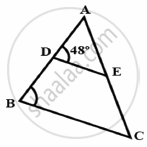Advertisements
Advertisements
प्रश्न
In the given figure, ∆ABC and ∆AMP are right angled at B and M respectively.
Given AC = 10 cm, AP = 15 cm and PM = 12 cm.
- Prove that: ∆ABC ~ ∆AMP
- Find: AB and BC.
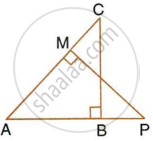
उत्तर
i. In ∆ABC and ∆AMP,
∠BAC = ∠PAM ...[Common]
∠ABC = ∠PMA ...[Each = 90°]
∴ ΔABC ∼ ΔAMP ...(By AA similarity)
ii.
`AM = sqrt(AP^2 - PM^2)`
= `sqrt(15^2 - 12^2)`
= 9
Since ∆ABC ∼ ∆AMP,
`(AB)/(AM) = (BC)/(PM) = (AC)/(AP)`
`=> (AB)/(AM) = (BC)/(PM) = (AC)/(AP)`
`=> (AB)/9 = (BC)/12 = (10)/(15)`
From this we can write,
`(AB)/9 = 10/15`
`=> AB = (10 xx 9)/15 = 6`
`(BC)/12 = 10/15`
`=>` BC = 8 cm
APPEARS IN
संबंधित प्रश्न
The diagonal BD of a parallelogram ABCD intersects the segment AE at the point F, where E is any point on the side BC. Prove that DF × EF = FB × FA
In each of the given pairs of triangles, find which pair of triangles are similar. State the similarity criterion and write the similarity relation in symbolic form:
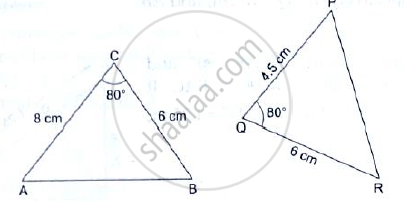
In a circle, two chords AB and CD intersect at a point P inside the circle. Prove that
(a) ΔPAC ∼PDB (b) PA. PB= PC.PD
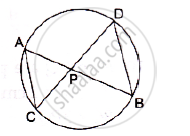
Select the appropriate alternative.
In ∆ABC and ∆PQR, in a one to one correspondence \[\frac{AB}{QR} = \frac{BC}{PR} = \frac{CA}{PQ}\]
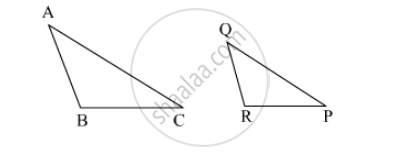
The scale of a map is 1 : 50000. The area of a city is 40 sq km which is to be represented on the map. Find: The length of a scale in km represented by 1cm on the map.
Construct a triangle similar to a given triangle PQR with its sides equal to `7/3` of the corresponding sides of the triangle PQR (scale factor `7/3 > 1`)
State whether the following triangles are similar or not: If yes, then write the test of similarity.
∠P = 35°, ∠X = 35° and ∠Q = 60°, ∠Y = 60°

Prove that if a line is drawn parallel to one side of a triangle intersecting the other two sides in distinct points, then the other two sides are divided in the same ratio.
Using the above theorem prove that a line through the point of intersection of the diagonals and parallel to the base of the trapezium divides the non-parallel sides in the same ratio.
In ΔPQR, S and T are points on PQ and PR respectively. `(PS)/(SQ) = (PT)/(TR)` and ∠PST = ∠PRQ. Prove that PQR is an isosceles triangle.
In figure, if AD = 6cm, DB = 9cm, AE = 8cm and EC = 12cm and ∠ADE = 48°. Find ∠ABC.
